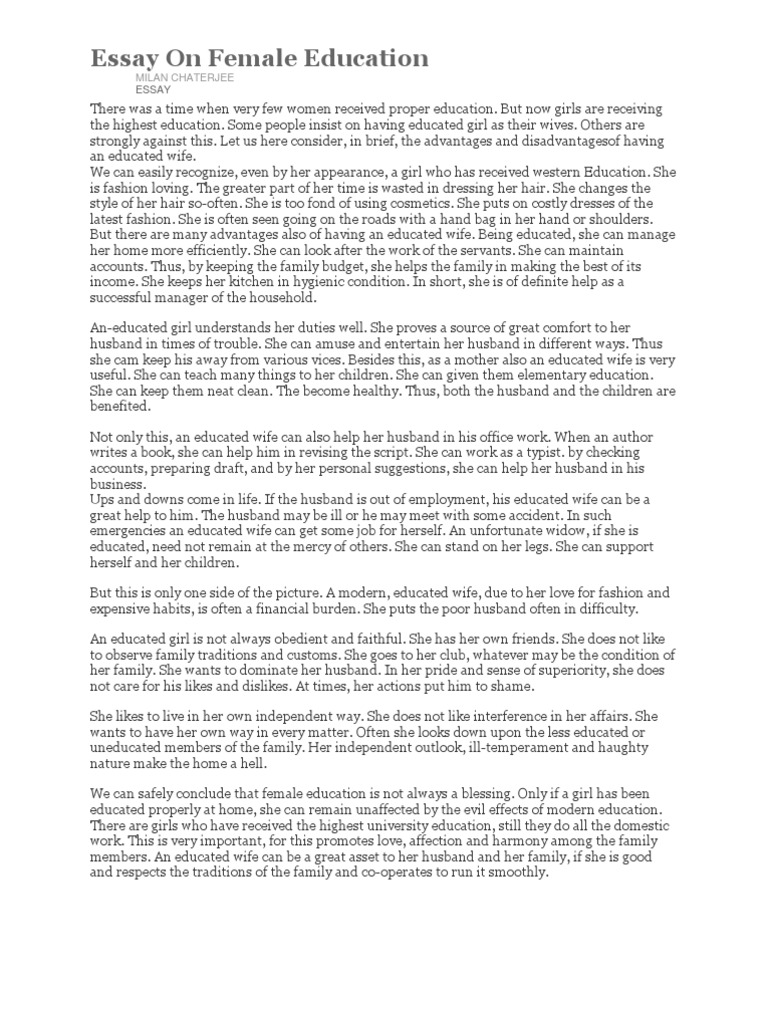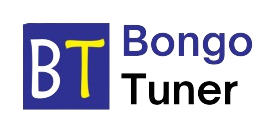Female education is essential for socio-economic progress. It empowers women and enhances overall development.
Ensuring access to education for women leads to a more equal and empowered society. Educated women can contribute significantly to their communities and the economy through their knowledge and skills. In this composition, we will explore the importance of female education in promoting gender equality, economic growth, and social progress.
By understanding the benefits of educating women, we can work towards creating a more inclusive and equitable society. Let’s delve into the positive impacts of female education and how it can transform lives and societies for the better.

Credit: www.scribd.com
The Importance Of Female Education
The importance of female education cannot be overstated as it empowers women, leads to social progress, and paves the way for gender equality. Access to education equips women with knowledge and skills, enabling them to achieve their full potential and contribute to the development of society.
Education plays a vital role in shaping a society. Empowering women through education leads to greater equality in communities. Females have the right to education for empowerment and equality.
Empowerment And Equality
Education empowers women to voice opinions and make decisions. It promotes gender equality in professional fields and social settings.
Economic And Social Development
Educated women contribute to economic growth and social welfare. They are better equipped to secure employment and income for themselves and their families.
Challenges To Female Education
The advancement of female education faces numerous challenges around the world. These challenges hinder access to quality education for girls and young women, perpetuating inequalities in our society.
Social And Cultural Barriers
Deep-rooted social and cultural barriers restrict the educational opportunities available to females. Gender stereotypes often dictate that girls should prioritize household duties over schooling, leading to a lack of support for their education.
Access To Quality Education
Unequal access to quality education is a significant hurdle for many girls. Limited school facilities in rural areas, poverty preventing families from affording education expenses, and lack of transportation options exacerbate the already existing disparities.
Impact Of Female Education On Health
Education plays a vital role in improving female health outcomes, empowering women to make informed decisions about their well-being and that of their families. By equipping women with knowledge and skills, education contributes to better maternal and child health, decreased fertility rates, and reduced vulnerability to diseases and health risks.
Investing in female education composition is essential for sustainable development and achieving gender equality in health.
Impact of Female Education on Health Female education has a profound impact on the health of women and their families. Improved literacy and knowledge empower women to make informed health decisions, leading to a reduction in maternal mortality rates and the promotion of healthier families. “`html
Reduced Maternal Mortality
“` One of the most significant impacts of female education on health is the drastic reduction in maternal mortality rates. When women are educated, they are more likely to have access to crucial information about prenatal care, safe childbirth practices, and postpartum care. This knowledge empowers women to make informed decisions about their health related to pregnancy and childbirth, ultimately lowering the risk of maternal mortality. “`html
Healthier Families
“` Education for women has a ripple effect on the health of their families. Better educated women are more likely to prioritize the health and well-being of their children, leading to healthier families overall. This includes better nutrition, improved hygiene practices, and greater awareness of preventive healthcare measures. Furthermore, educated women can serve as advocates for their family members’ health, promoting healthier lifestyles and seeking appropriate medical care when needed. In conclusion, female education plays a pivotal role in improving the overall health outcomes for women and their families. Reducing maternal mortality and promoting healthier families, educated women are better equipped to make informed health decisions, leading to improved well-being for themselves and their loved ones.
Female Education And Economic Empowerment
Female education plays a crucial role in economic empowerment, providing women with the tools and opportunities they need to thrive in the workforce. This article explores two key aspects of this relationship: increased job opportunities and entrepreneurial endeavors.
Increased Job Opportunities
When women have access to education, their career prospects expand exponentially. With knowledge and skills acquired through education, women can pursue a wide range of professional roles, breaking free from traditional gender norms. Education equips women with the necessary qualifications and confidence to compete in the job market, increasing their chances of securing stable employment and fair wages.
Furthermore, education opens doors to industries that were traditionally dominated by men. From STEM fields to leadership positions, women are increasingly occupying these spaces and challenging the status quo. As a result, more female role models emerge, inspiring future generations of women to pursue their dreams and make their mark in traditionally male-dominated professions.
Entrepreneurial Endeavors
Education not only boosts women’s employment prospects but also instills them with entrepreneurial skills. With knowledge of business management, marketing, and finance, educated women are better equipped to start and successfully run their own businesses.
| Benefits of Female Entrepreneurship |
|---|
| 1. Empowerment for women within their communities. |
| 2. Economic growth and contribution to the local economy. |
| 3. Job creation, both for women and others in the community. |
| 4. Increased innovation and creativity in the business sector. |
Female entrepreneurs bring unique perspectives and ideas to the table, fostering innovation and driving economic growth. By starting their own businesses, women not only create job opportunities for themselves but also for other individuals in their communities, ultimately contributing to poverty alleviation and local development.
In conclusion, female education not only enhances job prospects for women but also empowers them to become successful entrepreneurs. By investing in the education of women, societies can promote gender equality and unlock the full potential of their female population, leading to an economically prosperous and inclusive future.
Strategies For Promoting Female Education
Ensuring equal access to education for girls and women is crucial for creating a more equitable and prosperous society. Implementing effective strategies to promote female education is essential in bridging the gender gap and empowering women to reach their full potential. In this article, we will explore key strategies for promoting female education that include community outreach programs and government policies and investments.
Community Outreach Programs
Community outreach programs play a vital role in addressing the barriers that hinder girls’ access to education. By actively engaging with local communities, these programs raise awareness about the importance of female education and provide support to overcome specific challenges. Some effective community outreach strategies include:
- Organizing community workshops to educate parents and community members about the benefits of educating girls.
- Establishing mentoring programs that pair successful women with young girls, providing guidance and inspiration.
- Collaborating with local leaders, nonprofits, and organizations to create safe learning spaces for girls.
- Conducting door-to-door campaigns to identify and enroll out-of-school girls, ensuring they have access to educational opportunities.
Government Policies And Investments
Government policies and investments play a crucial role in enhancing access to education for girls and women. By prioritizing female education, governments can create an enabling environment where gender disparities in education are effectively challenged. Some effective government strategies include:
- Allocating a significant portion of the national budget to education, with a specific focus on initiatives targeting female access and retention.
- Implementing laws that enforce compulsory education for girls and prohibit gender-based discrimination in schools.
- Providing scholarships and financial assistance programs specifically designed to support girls and women in pursuing their education.
- Partnering with international organizations and NGOs to leverage resources and expertise in promoting female education.
By implementing community outreach programs and enacting supportive government policies, we can make significant progress in promoting female education. Through these strategies, we can create a brighter and more inclusive future, where every girl has the opportunity to pursue her dreams through education.

Credit: www.studypool.com
Case Studies Of Successful Female Education Initiatives
Case studies of successful female education initiatives have played a pivotal role in addressing gender disparities in education. These initiatives serve as inspiring examples of how dedicated efforts can pave the way for the empowerment of women and girls through education.
Global Initiatives
Across the globe, various international organizations have spearheaded commendable efforts to uplift female education. Organizations such as UNESCO and the Malala Fund have tirelessly worked to promote gender equality in education, striving to break barriers and provide equal opportunities for girls to access quality education.
Local Community Efforts
At the grassroots level, local community efforts have also proven to be instrumental in advancing female education. Non-governmental organizations, community-based groups, and individuals have initiated impactful programs and projects aimed at addressing the specific challenges that hinder girls’ access to education within their communities.
The Role Of Technology In Advancing Female Education
Technology plays a crucial role in advancing female education by providing access to online resources, virtual classrooms, and educational apps. These tools enable girls to overcome barriers such as distance and cultural restrictions, empowering them to pursue academic opportunities and expand their knowledge.
Tech innovations are revolutionizing the educational landscape for females globally. From e-learning platforms to digital literacy programs, technology is empowering women to access quality education like never before.
E-learning Platforms
E-learning platforms provide flexible, accessible learning opportunities for women of all ages.
Digital Literacy Programs
Digital literacy programs equip women with essential tech skills, opening doors to vast educational resources.

Credit: m.youtube.com
The Way Forward: Ensuring Equal Opportunities In Education
One of the key strategies to ensure equal opportunities in education is by empowering girls from a young age. By providing education that is tailored to their needs and interests, we can foster a more inclusive learning environment.
- Encourage girls to pursue studies in fields traditionally dominated by males.
- Offer mentorship programs to guide them through their educational journey.
- Provide access to resources and educational tools that support their learning.
- Implement curriculum reforms to eliminate stereotypes and biases.
- Include diverse perspectives in educational materials to promote gender equality.
- Train teachers to recognize and challenge gender biases in the classroom.
Frequently Asked Questions On Female Education Composition
What Is The Importance Of Female Education?
Female education is important as it empowers women, improves gender equality and provides economic benefits. Educated women have better opportunities, contribute to society, and make informed decisions, leading to positive social change.
How Does Female Education Affect Society?
Female education positively impacts society by reducing poverty, improving health outcomes, promoting gender equality, and fostering economic development. Educated women have better job prospects, higher earning potential, and contribute to the overall growth and well-being of their communities.
What Are The Barriers To Female Education?
Barriers to female education include cultural norms, child marriage, lack of access to schools, poverty, gender-based violence, and discriminatory practices. These barriers prevent many girls from accessing quality education and hinder their personal and societal development.
How Can We Promote Female Education?
Promoting female education can be achieved through various means, including investing in girls’ schools, providing scholarships, ensuring safe and inclusive learning environments, promoting gender equality in education policies, and addressing cultural and societal barriers that hinder girls’ access to education.
Conclusion
In light of the significant strides made in female education, it is evident that empowering girls through education is crucial for their personal and societal growth. By investing in girls’ education, we create a ripple effect that leads to improved health, economic prosperity, and sustainable development.
It is imperative to continue advocating for equal access to quality education for girls worldwide.

